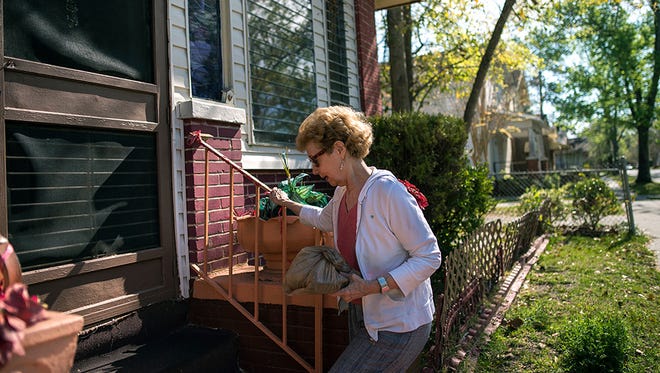Stop the Meals on Wheels funding freakout: Katrina Trinko
Americans are already jumping in to help people struggling with hard times.

Here’s the truth the Meals on Wheels funding freakout missed: We don’t need the government to help each other.
When President Trump announced his budget this month, there was an uproar over the proposal to end the $3 billion Community Development Block Grant program, which states use for a variety of services including — in some cases — Meals on Wheels for seniors. “How dead inside do you have to be to not want old people to get food?” demanded Late Night host Seth Meyers. “This program provides elderly shut-ins just minimal nutrition and a scrap of human dignity. What kind of heartless monster would be against that?” asked The Late Show's Stephen Colbert, while Cher tweeted “Guess Ppl Who Depend On Meals on wheels can just die.”
First, let’s straighten out the facts about Meals on Wheels and Trump’s budget. While Trump wants to eliminate the community development grant and a Community Services Block Grant that also helps the program in some states, the impact of his proposal is not clear. The primary source of federal support for the 5,000 local Meals on Wheels programs, accounting for 35% of their funding, is the Older Americans Act administered by the Department of Health and Human Services. Now that could be cut, too — the Trump budget calls for a 17.9% decrease to the HHS budget — but at this juncture, it’s unknown.
In short, while it’s possible there will be significant cuts to Meals on Wheels, it’s not certain.
But so what if there are?
Americans have already begun responding generously. Since the budget was announced, Meals on Wheels, which typically receives $1,000 a day in unsolicited donations online, has received close to $200,000, Jenny Bertolette, vice president of communications at Meals on Wheels, told me in an email. Controversial football player Colin Kaepernick donated $50,000 to the organization.
Trump’s morally repugnant budget must be defeated: Sen. Bernie Sanders
Trump budget cuts bankroll new waste: James Bovard
There’s also been a push to encourage people to personally help out: Liberal Sen. Kamala Harris of California took to Facebook to urge people as “upset by this proposed budget cut as I am” to “sign up to volunteer at Meals on Wheels during your lunch break or any other time you’re available,” and comedian Patton Oswalt, no fan of the Trump budget cuts, tweeted, along with a link to where to sign up for volunteering, “Meals on Wheels provides 2 essentials: healthy food and human contact. Help out if you can?” People are responding: Meals on Wheels recently had an 750% increase in one week in volunteers signing up on their website, Bertolette said.
All of this shows Americans don’t need Uncle Sam to mandate that they care about — and do something for — their fellow Americans suffering through hard times. Whether it’s giving to friends of friends via crowdfunding sites like GoFundMe or helping favorite charities, Americans have long been generous. According to the Philanthropy Roundtable, 67% of households make charitable contributions, averaging donating 4% of their income, and a quarter of adults volunteer.
With our national debt set to hit $20 trillion soon — almost double the $10.6 trillion it was when President Obama was inaugurated — Trump is right to recognize the need for cuts to our federal budget. It’s also important to put this into context: America is not about to end the most critical aid for the poorest among us.
POLICING THE USA: A look at race, justice, media
When did Republicans stop cutting spending?: Your Say
But that doesn’t mean the rest of us have no responsibility to help out those who are struggling. Instead, fewer tax dollars going to certain programs provides a chance to look at our own spending decisions, and see whether we can give more, if we can forgo pricier splurges — or perhaps something harder. “Love means to be willing to give until it hurts,” Mother Teresa, no stranger to charity, said at the National Prayer Breakfast in 1994.
Those are tough words — but they also signal opportunity. In our free decision to give more emerges a new seriousness about our role as members of communities: a recognition of the responsibility we have to each other, and particularly to those facing homelessness, hunger, and other problems related to poverty. And perhaps, too, they give us incentive to work more at the local level, to directly engage with our neighbors in need by volunteering and financially supporting our community charities, like Meals on Wheels affiliates.
Of course, there’s no need to wait for government cuts to increase our own charitable contributions. But whatever the final government budget, the new volunteers and donations for Meals on Wheels show, as Hillary Clinton is fond of saying, that we’re “stronger together” —even if that’s not through the government, but through community and voluntary bonds.
Katrina Trinko, a member of USA TODAY's Board of Contributors, is managing editor for The Daily Signal. Her views do not represent The Heritage Foundation, her employer. Follow her on Twitter: @KatrinaTrinko
You can read diverse opinions from our Board of Contributors and other writers on the Opinion front page, on Twitter @USATOpinion and in our daily Opinion newsletter. To submit a letter, comment or column, check our submission guidelines.